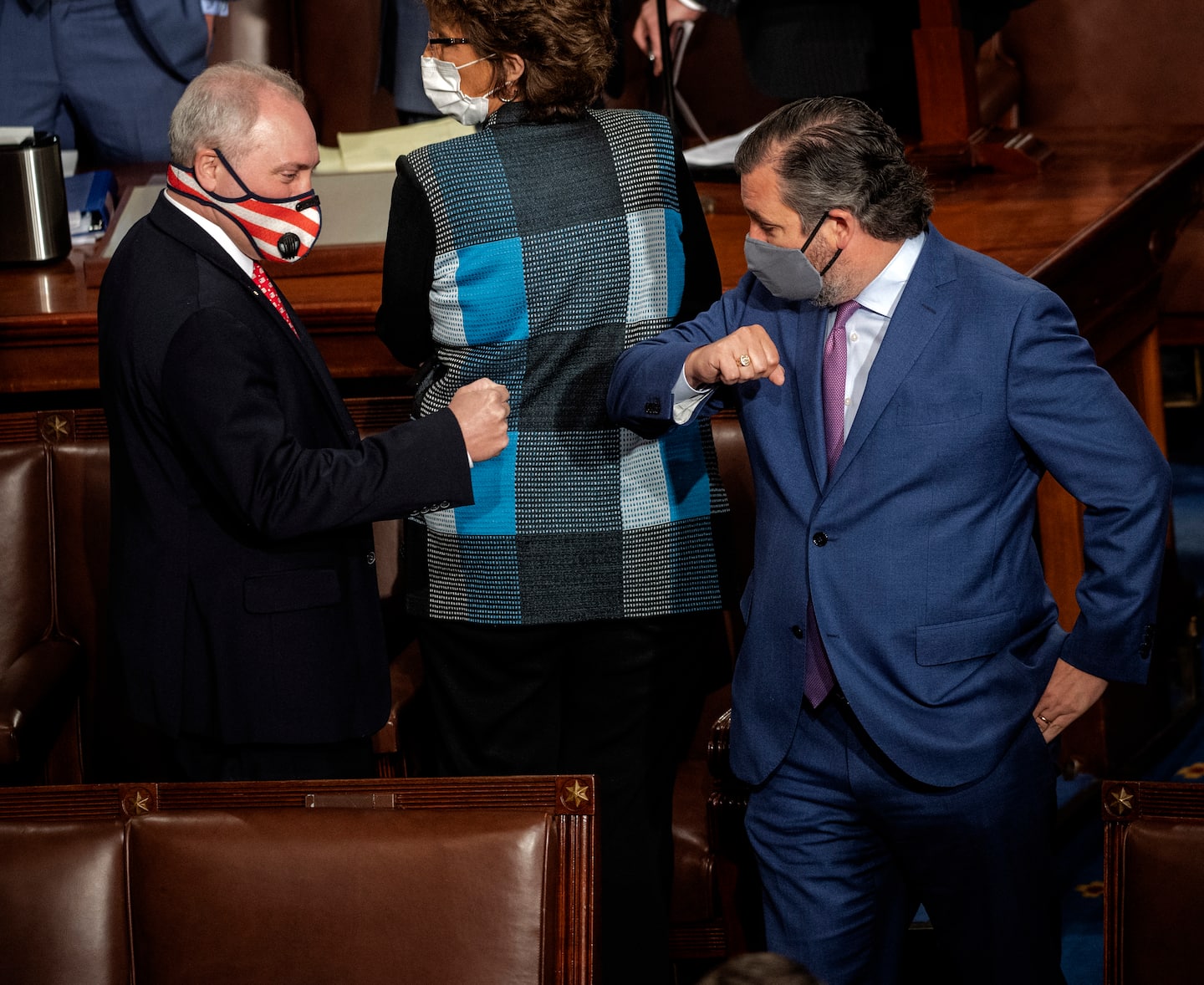The GOP’s sudden and convenient distancing from Trump’s voter fraud claims

That’s perhaps understandable, given the historic nature of what we saw Wednesday. As many have noted, though, it’s also thoroughly convenient now that Trump is finally, admittedly a lame duck. Resigning or speaking up with two weeks to go in an administration is a great way to insulate yourself from blame while forfeiting little more than the support of an outgoing president’s most devoted supporters and a single paycheck.
And if there was one telling moment when it comes to how quickly Trump’s allies have evolved this week, it came Thursday from Sen. Ted Cruz (R-Tex.).
“I think yesterday, in particular, the president’s language and rhetoric crossed the line, and it was reckless,” Cruz told a local ABC station. “I disagree with it, and I have disagreed with the president’s language and rhetoric for the last four years.”
Cruz added: “If you looked to what I have said, you will not find me say the same language or rhetoric.”
Cruz was one of two ambitious GOP senators with potential 2024 designs — the other being Sen. Josh Hawley (R-Mo.) — who spearheaded the unprecedented attempt to reject the certified results from states which Trump narrowly lost. And he has something of a point: The defense of Trump’s election challenge often didn’t actually involve vouching for his far-flung conspiracy theories about voter fraud and the election being definitively “stolen.”
But that’s also kind of the point. When a president says so many false and baseless things about the election, defending his cause can’t help but be seen by plenty of people as validating those things. Unless you delineate all of it, it all gets lumped together in the minds of those who would do what those who stormed the Capitol did.
And indeed, there was very little delineation.
In announcing his gambit to reject states’ electors, for instance, Cruz cited “unprecedented allegations of voter fraud.” Trump then tweeted the quote but changed the word “allegations” to “amounts” — making it appear that Cruz had directly echoed his message that this historic amount of fraud had indeed occurred. There is no indication that Cruz sought to correct the record.
Cruz also vouched for a desperate and legally dubious lawsuit from Texas Attorney General Ken Paxton (R) seeking to block the electoral college from accepting the results in four states. He even went so far as to grant Trump’s request to argue it before the U.S. Supreme Court. The court instead rejected the case, as had been widely expected.
Cruz has indeed criticized Trump occasionally over the past four years, including for his comments on NATO, his suggestion that China investigate the Bidens and a handful of other things. He also offered a much different response to the tragedy in Charlottesville than Trump, directly and forcefully calling out the racism that Trump danced around.
“It has become a popular Democratic talking point, it has become a popular media talking point, that it is Trump who is going to dispute the election,” Cruz said, before saying he thought there would be a peaceful transfer. He added: “But what I fear is the reaction of the extreme left if Joe Biden loses the election.”
Few comments about Trump’s posture in recent months have aged so poorly; Trump did dispute the election, as he had previewed many times over, and it was the reaction of the extreme right that resulted in five deaths.
As NBC Montana’s Maritsa Georgiou noted, though, Daines’s campaign had sent a fundraising appeal shortly after the election which said: “Dems are stealing the election. Trump needs our support.” Daines told her that he wasn’t involved in that appeal, but shortly after the message was sent Nov. 5, Georgiou had inquired about it, and Daines’s team declined to back off. “Sen. Daines stands with President Trump as do Montanans,” it said at the time.
Former White House communications director Alyssa Farah was among the first Trump allies to speak out this week. Unlike some others, though, she didn’t wait for the dust to settle, instead tweeting early in the unrest that Trump needed to more forcefully speak out against it — something Trump declined to do until more than 24 hours later.
Farah spoke to Politico on Thursday and said her decision to leave the administration in December had been directly because she worried about the dangers posed by Trump’s rhetoric about the election. She said she had been overruled when she planned to acknowledge that Trump had lost after the election.
“I made the decision to step down in December because I saw where this was heading, and I wasn’t comfortable being a part of sharing this message to the public that the election results might go a different way,” Farah said. “I didn’t see that to be where the facts lay.”
Farah, again, has been foremost among current and former Trump administration officials in linking Trump’s rhetoric to what transpired this week. To the extent that she truly worried about this devolving into a bad situation, though, she didn’t share those concerns publicly.
As many have noted, this was a rather predictable result of this entire crusade. Even if you set aside the words that Trump’s critics allege might have more directly incited supporters to resort to violence — including Rudolph W. Giuliani’s line calling for “trial by combat” mere hours earlier — what might you expect if people believe an election was truly being “stolen” from them or that democracy and the courts could no longer be trusted to deal with it? There is basically one remedy left at that point, and it involves force.
Through much of Trump’s tenure, Republicans have often supported him halfway without accounting for the gap between them — and often pretending, when pressed, that it doesn’t exist. That has consequences, because those who aren’t so discerning, as believers of Trump’s voter fraud crusade clearly aren’t, will interpret it as being no daylight whatsoever.
Update: President-elect Biden addressed the roles of Cruz and Hawley in the voter fraud claims Friday:
“You say it and say it and say it and say it. The degree to which it becomes corrosive is in direct proportion to the number of people who say it. And so it’s interesting to me – and I was pleased to hear more prominent Republicans say to me – that Ted Cruzes of the world are responsible in terms of people believing the lies as – not as responsible, but similarly responsible, like Trump. But they didn’t say go to the Capitol, ‘I’ll be with you, follow.’ That’s a different story.”
*** This article has been archived for your research. The original version from The Washington Post can be found here ***


